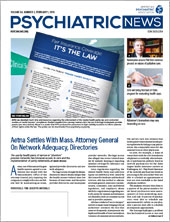Delirium—an acute brain condition characterized by disturbed thinking, agitated behavior, and delusions—is one of the most common complications in patients with a critical illness. Despite limited evidence of the effectiveness of antipsychotics at reducing delirium, these medications are often prescribed to patients in the intensive care unit (ICU). The results of a large clinical trial now show that there is no evidence that either haloperidol or ziprasidone provides any benefit over placebo in ICU patients with delirium.
The small number of previously published studies on antipsychotics and delirium focused on whether these drugs can prevent or reduce the severity of delirium if given ahead of time (most have suggested no prophylactic benefit). The study, published in the December 27, 2018, issue of the New England Journal of Medicine, asked whether patients might benefit from antipsychotics administered soon after developing delirium.
Timothy Girard, M.D., a visiting associate professor of critical care medicine at the University of Pittsburgh and colleagues with the MIND-USA (Modifying the Impact of ICU-Induced Neurological Dysfunction-USA) consortium assessed 566 patients who were admitted to one of 16 U.S. medical centers with acute respiratory problems or shock and subsequently developed delirium. At the onset of delirium, 192 patients received intravenous haloperidol (up to 20 mg daily), 190 received intravenous ziprasidone (up to 40 mg daily), and 184 received placebo infusions. Patients were kept on the antipsychotic medications or placebo for up to 14 days or discharge from the ICU, whichever occurred first.
The investigators found no significant difference between the three patient groups on any clinical outcomes. Compared with placebo, neither antipsychotic reduced the time patients spent without delirium and/or coma during the 14-day intervention; patients in all three groups spent between 8 days and 8.5 days delirium/coma-free. Patients who received antipsychotics also had similar outcomes to those receiving placebo in terms of 30-day and 90-day survival rates, the need for opioids or other sedatives, time spent on mechanical ventilation, or time until hospital discharge.
“One possible reason that we found no evidence that the use of haloperidol or ziprasidone resulted in fewer days with delirium or coma than placebo is that the mechanism of brain dysfunction that is considered to be targeted by antipsychotic medications—increased dopamine signaling—may not play a major role in the pathogenesis of delirium during critical illness,” Girard and colleagues wrote.
Another possibility, noted by Thomas P. Bleck, M.D., in an editorial accompanying the study, is that the current concept of delirium may be flawed.
“The neurochemistry of sudden alteration in mentation [mental activity] is complex and involves several neurotransmitters as well as structural, immunologic, and network alterations and possible brain infection that is not clinically evident,” wrote Bleck, a professor of neurological sciences at Rush Medical College in Chicago. “The investigators deserve credit for conducting a difficult trial, but it would have been astounding if there were a single magic bullet for the restitution of normal brain function in ICU patients with delirium.”
Girard and colleagues noted that while the findings did not show any evidence of a benefit of antipsychotics on delirium overall, there may be some subgroups of delirium patients who may benefit from these medications. These groups may include those with particularly hyperactive symptoms or patients also going through alcohol withdrawal, who might benefit from antipsychotic intervention.
This study was supported by grants from the National Institute on Aging, National Center for Advancing Translational Sciences, and the Department of Veterans Affairs Geriatric Research Education and Clinical Center. ■
“Haloperidol and Ziprasidone for Treatment of Delirium in Critical Illness” can be accessed
here. The accompanying editorial, “Dopamine Antagonists in ICU Delirium,”
here.
